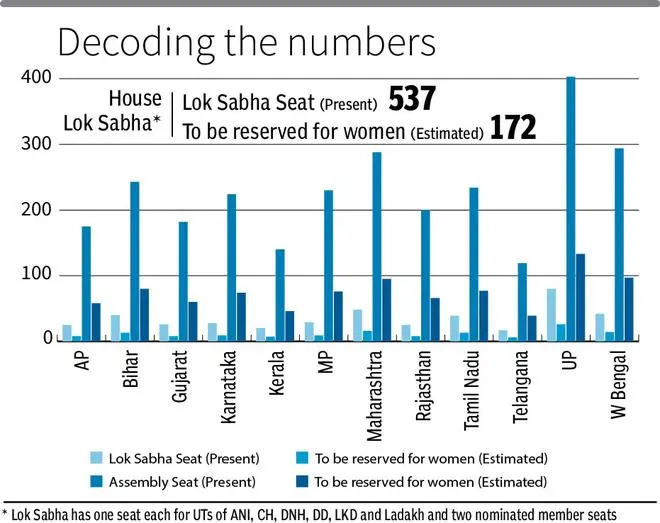
Prime Minister Narendra Modi speaks in the Lok Sabha during a special session of the Parliament on Sept. 19, 2023. | Photo Credit: PTI
The first piece of legislation Parliament will consider after moving into the new precincts is the “Nari Shakti Vandan Adhiniyam” or Women’s Reservation Bill that proposes to provide one-third reservation to women in Lok Sabha and state legislatures. With much fanfare, the government introduced the Bill on Tuesday but it will be rolled out only after census and delimitation exercise is completed which, in effect, pushes it at least until 2029.

The Constitution (One Hundred and Twenty Eighth Amendment) Bill, 2023, which was introduced in the Lower House through a supplementary list of business, provides for 30 per cent reservation for women for a period of 15 years. Seats reserved for women will be rotated after each subsequent delimitation exercise. It may be noted that Constitution amendment requires ratification by at least 50 per cent of the states.

Also, within the reservation of seats provided for Scheduled Castes and Scheduled Tribes under Article 330 of the Constitution, a provision has been provided for reservation of women for these categories. This does not imply that there is new “reservation within reservation” i.e. quota for SC/ST women within 30 per cent quota for women which was long-pending demand of a majority of social justice parties including Rashtriya Janata Dal, Samajwadi Party, etc. Rather, it is quota for SC/ST women within the already existing Constitutional scheme for quota for SC/STs in legislatures. However, there is no mention of reservation for OBCs.
Speaking in Parliament, Prime Minister Narendra Modi described the Bill as “historic” and hoped that this “will further strengthen our democracy.” Most Opposition parties, however, termed it a “stunt” because of the inordinate delay in its implementation because of the provision about census and delimitation exercise to be held before reservation is to be rolled out.
This is the reason why parties like the Congress, which is supporting the Bill, attacked the government. Describing the Bill as a “betrayal”, senior Congress leader Jairam Ramesh said: “As we had pointed out earlier, Modi government has not yet conducted the 2021 decadal census... Now it says that reservation for women will come into effect only following the first decadal census conducted after the Women’s Reservation Bill has become an Act. When will this census take place? The Bill also says the reservation will come into effect only after the publication of the next Census and the subsequent delimitation exercise. Will the census and the delimitation be done before the 2024 elections?”
Echoing the same sentiment, AAP leader and Delhi minister Atishi questioned the provision of delimitation and census. “This means that women reservation won’t be implemented ahead of the 2024 Lok Sabha polls,” she said.
BSP supremo Mayawati made clear her party’s willingness to back any Bill enabling women’s reservations in Parliament and legislatures, even if it doesn’t include their request for SC, ST, and OBC sub-quotas.
AIMIM leader Asaduddin Owaisi said the government should have also provided for reservation of Muslims and OBCs.
Published on September 19, 2023

Comments
Comments have to be in English, and in full sentences. They cannot be abusive or personal. Please abide by our community guidelines for posting your comments.
We have migrated to a new commenting platform. If you are already a registered user of TheHindu Businessline and logged in, you may continue to engage with our articles. If you do not have an account please register and login to post comments. Users can access their older comments by logging into their accounts on Vuukle.